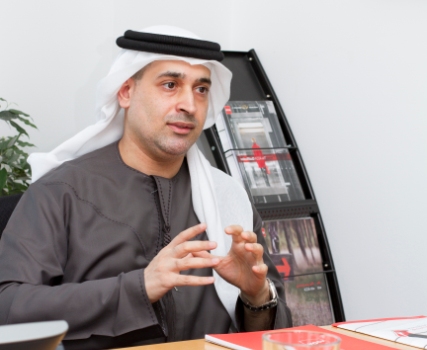ACCA survey highlights need for broader skills set in public and private sectors…

Ahmad Darwish, UAE National and Finance Manager, DP World and Chairman of ACCA’s Member Advisory Committee.
THE UAE’s Chief Financial Officers in both the public and private sector require finance professionals who are skilled in matters right across the value chain according to a new survey conducted by ACCA (the Association for Chartered Certified Accountants), the global body for professional accountants.
Titled; “The Complete Finance Professional: Why breadth and depth of finance capability matter in today’s finance function”, the new global survey seeks to outline the skills required of new entrants into the accounting profession by company CFOs working in industry.
Seventy seven Chief Financial Officers in the UAE were surveyed as part of the pool of over 500 professionals drawn from other markets including the UK, Malaysia, Russia and China to determine what skills are necessary for new entrants to be able to demonstrate that they can support business growth, understand the full finance value chain from budgeting to reporting, and have a sound understanding of business ethics.
Strong grounding in business
Over 90% of UAE based CFOs sampled told ACCA that new recruits need to have a clear ability to link business strategy to financial reporting. In what is considered a reflection of the region’s need for greater standards of corporate governance and accountability, 96% of UAE based CFOs indicated that a strong grounding in business ethics is essential to their operation.
Commenting on the research, Ahmad Darwish, UAE National and Finance Manager, DP World and Chairman of ACCA’s Member Advisory Committee, said:
“In today’s economy, it is more important than ever that those working in the finance function have an understanding that goes beyond the balance sheet and cash flow statement. The ability to analyse a business and contribute towards strategic planning are essential skills for all new financial professionals working in industry.
“A keen understanding of business ethics is also vital to ensure that public and private sector organisations are acting in accordance with the highest standards of corporate governance, accountability and transparency,” Ahmed added.
Nauman Asif Mian, Chief Financial Officer at Bayt.com Inc, said;
“In an increasingly globalised economy the business world is becoming smaller and more competitive every day. When you couple this with the higher standards that society holds the business community to, the requirement for top talent becomes even more focused right throughout an organisation.
“From a business perspective, I require talent, who, as a graduate from day one can provide a combination of core accounting skills and act in a more strategic function.”
Competency framework
ACCA has built a qualification curriculum that is designed to meet the complete needs of businesses operating today. This competency framework covers a wide range of models including; corporate reporting, leadership and management, strategy and innovation, financial management, sustainable management accounting, law and taxation, audit and reassurance, governance risk and control, stakeholder relationship management, professionalism and ethics.
Stuart Dunlop, Head of MENASA, ACCA, commented:
“What this survey shows is that since the financial crisis of 2008, the bar has been set higher for everyone in general, but the financial heart of a company in particular requires a new breed of accounting professional.
“At ACCA, we believe that we offer a curriculum that requires trainee accountants to build a solid portfolio of skills before they enter the workforce, and even then it is only after they have completed a set period of time in industry before we can award them their full qualification.
“The respondents from the UAE in the survey have shown how far the finance function has moved from book keeping and cashflow management to the strategic heart of a company today.”












